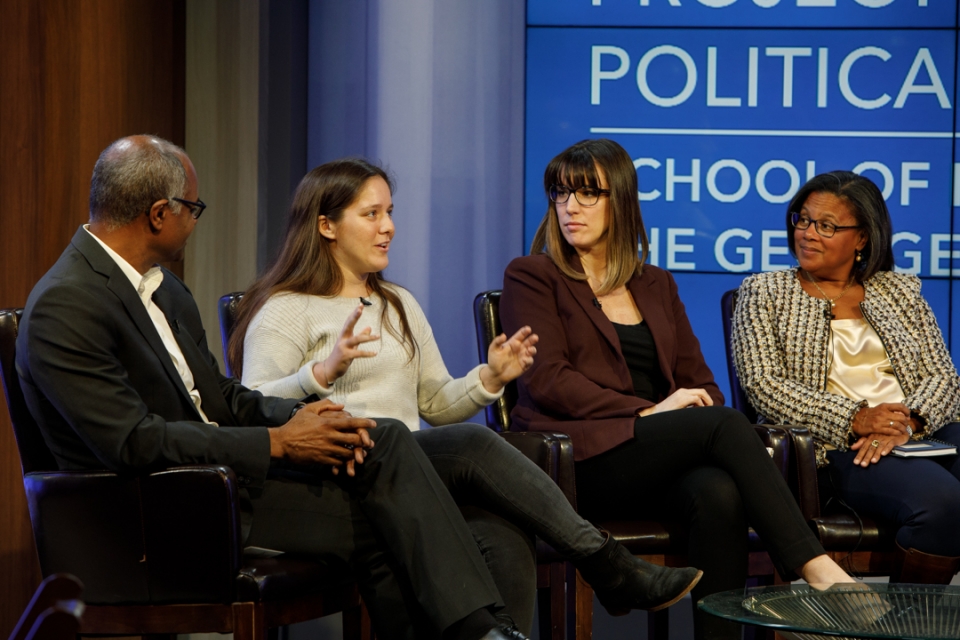A version of this article originally appeared on GW Today.
By Ruth Steinhardt
The School of Media and Public Affairs launched the Project on Ethics in Political Communication on Tuesday, March 5, with a panel discussion on how to balance moral and competitive imperatives in politics.
SMPA Director Frank Sesno said the project will promote the study, teaching and practice of ethics among professionals in and aspirants to the field of political communication, noting that analogous initiatives already exist for business and law students.
“When your job is to win, to persuade, to organize and to mobilize, do the ends justify the means?” Sesno asked in his introduction to the panel, summarizing the project’s central question. “Is any way of winning in bounds?”
SMPA Associate Professor of Media and Public Affairs Peter Loge, the project’s founding director, said his goal is not to impose artificial civility on political discourse but to promote “honest conflict.”
“The quality of our conversations reflects the quality of our democracy,” Loge said. “If the conversation is corrupt, unethical and shallow, if it’s preying on our worst instincts, then our democracy will reflect that. We can have a conversation that is honest, that is clear, that is intellectually rigorous — and it can also be aggressive, direct and angry, and our democracy will be better.”
The expert panel included SMPA junior Samira Baird, a former digital media intern on Hillary Clinton’s 2016 presidential campaign; Crystal Benton, former press secretary for the late Sen. John McCain (R-Ariz.); Emmy Award-winning director and SMPA Shapiro Fellow Jeffrey Blount; and Chrissie McHenry, principal with public affairs and strategic communications firm the Raben Group. Jeffrey Brand, associate dean of graduate studies and associate professor of philosophy in the Columbian College of Arts and Sciences, moderated the conversation.
Benton remembered McCain as an unusually ethical political communicator who instilled in his staff a strong sense of what was and was not appropriate material for use, particularly in the heated atmosphere of a campaign.
“There was a buck that stopped, and it stopped with him,” Benton said.
During his 2008 presidential campaign, for instance, McCain refused to permit his campaign staff to piggyback on press attention to then-Sen. Barack Obama’s affiliation with controversial preacher Jeremiah Wright. To do so would have been expedient and might have “won” the campaign for at least a news cycle or two, Benton said. But McCain was adamant: the story was off-limits.
“He really drew a hard line that we weren’t going to use that,” Benton said. “He saw it as an attack on Senator Obama’s character, and that wasn’t what we were trying to do.”
Blount approached the question of ethics from a different perspective — as a journalistic observer and analyst, rather than a representative of a politician.
“As a journalist, it’s easy to live by the rule that your world needs to be controlled by facts,” he said. “But when you move to political communication, it’s hard to stay with those clear rules. It becomes a personal thing: What are you willing to do in order to gain?”
He said he saw problems arising where communicators, politicians, reporters and audiences fail to agree on a common moral playing field.
Rather than asking what ethical considerations should moderate their behavior, politicians are asking, “Can I get away with saying this?” Blount said. “In a certain world that’s okay, in another world it’s not.”
For Baird, already a veteran of multiple political campaigns, winning takes a back seat to being “able to sleep at night.”
“One of the questions [for political communicators] is ‘Who are we in service to?’” she said. “I think you’re in service to the people who elected your principal.”
But her focus on digital media can sometimes make that difficult, Baird said, as the ethics of online campaigning are both muddy and easy to subvert.
“The internet lacks transparency, and digital ads, though efforts have been made, still lack transparency,” she said. “You can launch a whole narrative about a candidate on a digital ad campaign with very little scrutiny. So it raises a lot of ethical questions: Where do you draw the line when you do that work, where there might not be accountability?”
McHenry said absolute alignment on every issue is not necessary for ethical strategic communication — but a common humanist conviction is.
“I don’t necessarily even want to agree with the candidates I support a hundred percent,” she said. “What I want to know is that they share fundamental truths about who we are as people and who we want to be. If we disagree on the path, I can live with that.”
Benton said her time in McCain’s office solidified her conviction that a political figure can put integrity before ideology or party loyalty.
“We weren’t at the time deeply burdened by” a duty to any particular political party or agenda, Benton said. “Our duty, in a very romantic sense, was to elevating democracy.”


